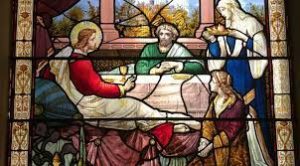HOMILY WEEK 16 06 – Year I
Hospitality, Contemplation, and the Transformative Healing Journey:
Memorial of Saints Martha, Mary and Lazarus
(Jer 26:1-9; Ps 69; Jn 11:17-27)
*****************************************
This memorial of Saints Martha, Mary and Lazarus was just recently added to the liturgical calendar by Pope Francis. St. Martha was already celebrated on Jan. 29 in the General Roman Calendar before the Second Vatican Council, but St. Lazarus and St. Mary had been originally left off due to uncertainty about the identity of Mary Magdalene. The decree explained that these uncertainties “have been resolved in recent studies and times,” and pointed out that Mary and Lazarus are already commemorated on July 29th in the Roman Martyrology, the Church’s official catalog of martyrs and saints.
There are two options for the gospel for today, from St. John and St. Luke. These two gospels invite us into a healing journey, and to incorporate into our lives the special gifts each of these saints offer to us – hospitality, contemplation and transformation.

Saints Martha, Mary and Lazarus
Saints Martha, Mary and Lazarus were siblings living in Bethany outside Jerusalem, and all three were friends of Jesus. In expanding this feast day by adding Mary and Lazarus to the day honouring Martha, the papal decree establishing this memorial reads: “In the household of Bethany, the Lord Jesus experienced the family spirit and friendship of Martha, Mary and Lazarus, and for this reason the Gospel of John states that he loved them.
Martha generously offered him hospitality, Mary listened attentively to his words, and Lazarus promptly emerged from the tomb at the command of the One who humiliated death.” Their three-fold witness “in welcoming the Lord Jesus into their home, in listening to him attentively, and in believing that he is the resurrection and the life’ is celebrated this day.
The account from John, an excerpt from the resuscitation of Lazarus, puts the emphasis on a healing journey in seven stages. First, Jesus waits for two more days when he hears his friend Lazarus is dying – as he waits for us to be ready for him to break into our lives. Then he overcomes the fear of the disciples, as he overcomes our fear of change and newness in many different ways.
Next, he strengthens Martha’s faith that something can happen to her brother, not at the end of time, but right now – as Jesus in many ways is always strengthening our faith in his power to work in our lives. When Mary comes out crying, he does not rescue her from her pain, but rather, enters into it and shares her pain, crying with her. Likewise, Jesus is with us in our pain, not preventing our suffering, but sharing it and helping us make it into redemptive suffering.
Then, at the cemetery, Jesus turns to the community, the men, and commands them to remove the stone, which he could have done himself. But Jesus works through community, and is doing so right now, loosening up the stones in the protective walls we have built around ourselves to avoid further pain, through the presence of others who care about us in our lives.
Finally, it is his turn, so Jesus prays to the Father, and commands Lazarus to come us. So it is with us – in our healing journey, there will be times when Jesus will call us forth by name, inviting us to become our true selves. That might not even be felt by us – a transformation that others might even notice first, before we are even aware of it.
But when Lazarus comes out, stinky, still wrapped in restrictive bands of cloth, barely able to walk and unable to see, Jesus hands him over to the community again, probably the women this time, with the command to unbind him and let him go free. And so it is with us, as we continue to journey with community, support groups, sponsors, mentors, spiritual directors, friends who care and give us helpful feedback.
The Eucharist is a truth that many people have a hard time believing – that Jesus is truly present in Word and in the consecrated bread and wine, wanting to transform us and give us new life. To participate in the Eucharist is to be embraced by God in a very special way.
So, let us put our complete faith in Jesus, continue our healing journey, and balance hospitality and contemplation in our lives.



